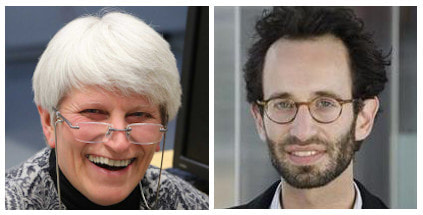|
By Peter Bandettini & the OHBM Neurosalience production team  Profs Aina Puce (Left) and Daniel Margulies. Profs Aina Puce (Left) and Daniel Margulies.
In this podcast we discuss some of the history and evolution of OHBM. We also talk about some of the challenges that it has faced in recent years with world events causing a last minute change in venue three times. We talk about the improvements in this year’s virtual meeting as well as the growth in the engagement of younger members of OHBM with all the chapters and SIGs.
Guests:
Aina Puce, Ph.D. Aina has been active in OHBM since the beginnings. She is Chair of OHBM Council, otherwise known as President of OHBM and Director of the Indiana University Research Imaging Facility and the Eleanor Cox Riggs Professor of Psychological and Brain Sciences. After a Ph.D. from the University of Melbourne in 1990, she was a post-doc then an associate research scientist at Yale. She moved back to University of Swinburne in 1998, then back again to the states in 2002 to West Virginia University. Finally, she moved to Indiana University in 2008. She is an expert in visual neuroscience and EEG as well as fMRI. Daniel Margulies PhD. Daniel started in the US, receiving his BS in 2005 from NYU then in 2008, earned his MS at the European Graduate School in Saas Fee, Switzerland and Ph.D. at Humboldt University in Berlin. From 2009 to 2011 he was a post-doc in the Department of Neurology at the Max Planck Institute for Human Cognitive and Brain Sciences in Leipzig then a group leader of the Neuroanatomy and Connectivity group at Max Planck, Leipzig from 2011-2017. He received the 2018 OHBM Young Investigator (now called Early Career) award and received the Otto Hahn Award in 2010. He has been a pioneer in fMRI connectivity methods and has recently produced novel and penetrating work elucidating the organizational gradient that spans between sensorimotor and trans-modal areas. --- The Neurosalience production team consists of Anastasia Brovkin, Katie Moran, Nils Muhlert, Kevin Sitek, and Rachael Stickland.
0 Comments
By Peter Bandettini & the OHBM Neurosalience production team  Drs Jean Chen (left) and Molly Bright. Drs Jean Chen (left) and Molly Bright.
This week’s podcast is centered on physiologic fMRI. Generally, when people think of fMRI, they think of a way to map neuronal function, however there is so much information about neurovascular physiology in the signal. Many researchers who use fMRI may not realize all of the potentially untapped information—and confounds!—in the fMRI time series. Dr Jean Chen and Dr Molly Bright each run research groups that focus on this information in complementary ways. Both use physiologic manipulations and an array of acquisition methods to probe and characterize details of the hemodynamic response, though their two research programs focus on different aspects of the haemodynamic response function. In this podcast, they highlight the importance of physiologic fMRI for the field. They also consider the challenges facing women in male-dominated research fields and how the life of women scientists might be improved.
By Peter Bandettini & the OHBM Neurosalience production team  Dr Michael Fox Dr Michael Fox
In this week’s podcast, you’ll hear about clinical applications of resting-state fMRI from Dr Michael Fox. You’ll hear some of the highlights of his research, from the beginnings at Wash U, including his early work on resting-state fMRI and the issue of global signal regression, to his more recent pioneering work on lesion network mapping. Through this, you’ll find out about how lesions can impact behavior through their effects on functional networks. This approach is a promising inroad of fMRI towards clinical utility.
Guest:
Michael D. Fox, MD, PhD, is the founding Director of the Center for Brain Circuit Therapeutics at Brigham and Women’s Hospital and Associate Professor of Neurology at Harvard Medical School. He is also the inaugural Raymond D. Adams Distinguished Chair of Neurology and the Kaye Family Research Director of Brain Stimulation. He completed a degree in Electrical Engineering at Ohio State University, an MD and PhD at Washington University in St. Louis, and Neurology Residency and Movement Disorders Fellowship at Mass General Brigham. Clinically, he specializes in the use of invasive and noninvasive brain stimulation for the treatment of neurological and psychiatric symptoms. Dr. Fox’s research focuses on developing new and improved treatments for brain disease by understanding brain circuits and the effects of neuromodulation. --- The Neurosalience production team consists of Rachael Stickland, Kevin Sitek, Katie Moran and Anastasia Brovkin |
BLOG HOME
Archives
January 2024
|
 RSS Feed
RSS Feed